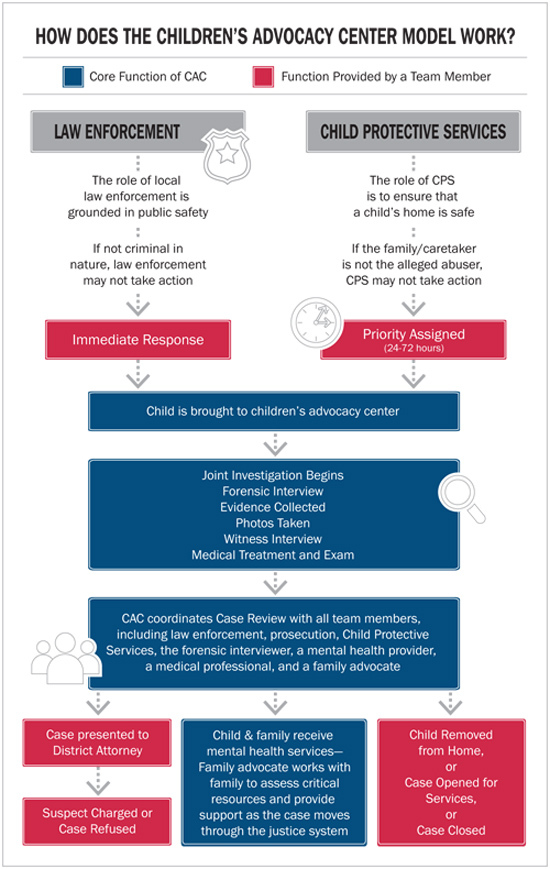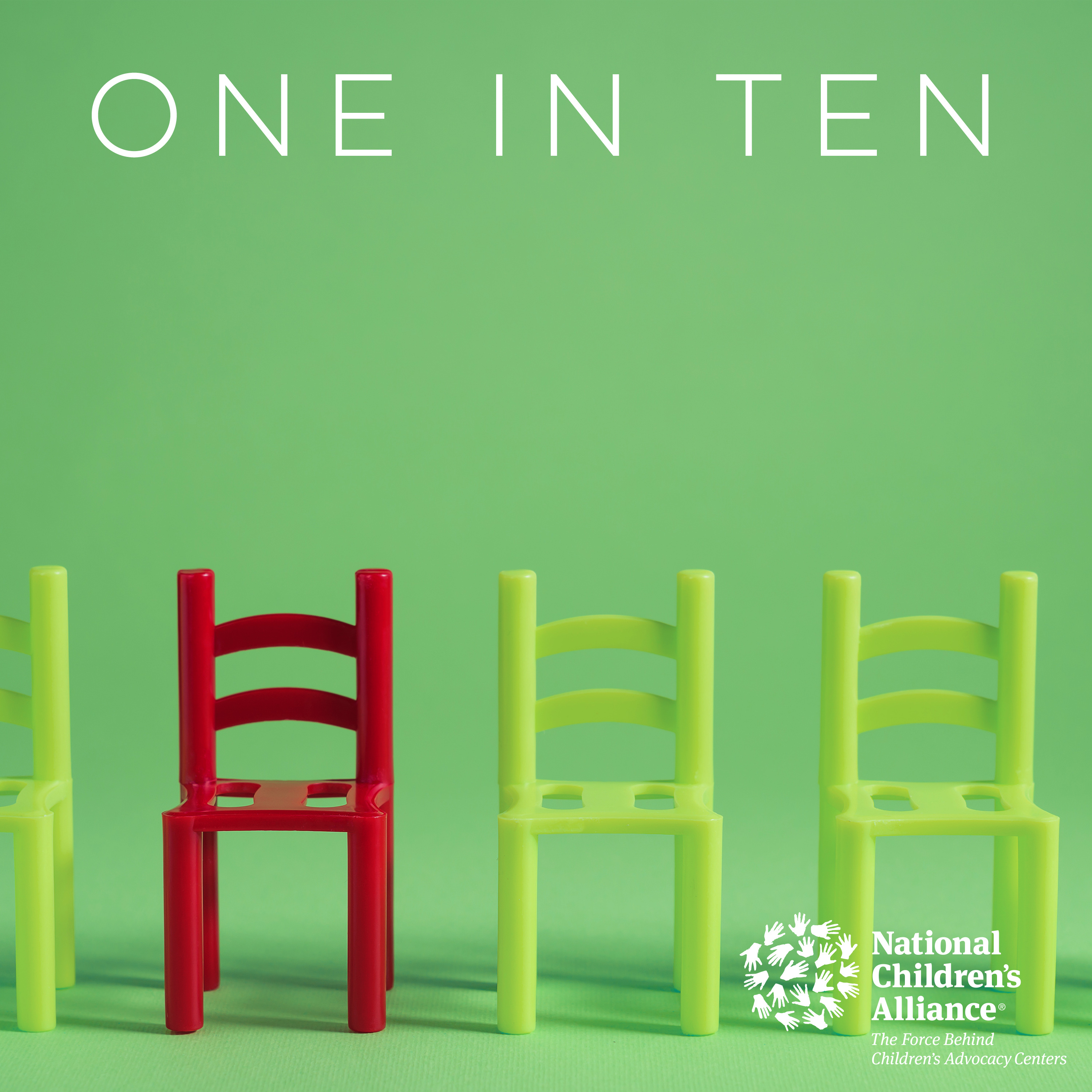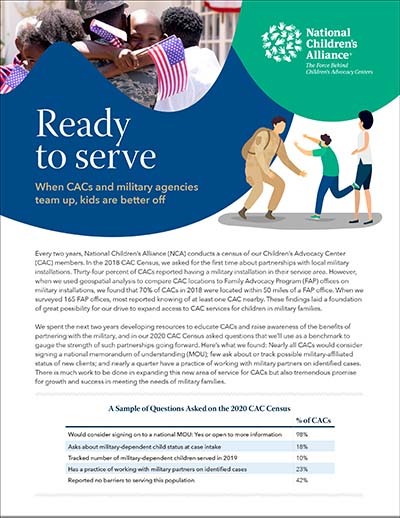
Resources for Military Partners
Over 900 Children's Advocacy Centers (CACs) are available to provide services to children and families across the country. Learn more about the CAC model, CAC services, and how you can partner to provide coordinated services to military families by exploring the resources below.
Have questions or need additional information? Please reach out to Heather Provencher, NCA's Senior Manager for Federal Partnerships.

What is a CAC?
When police or child protective services believe a child may be experiencing abuse, the child is brought to the CAC—a safe, child-focused environment—by a caregiver or other “safe” adult. At the CAC, the child tells their story once to a trained interviewer who knows the right questions to ask in a way that does not not retraumatize the child. Then, a team that includes medical professionals, law enforcement, mental health, prosecution, child protective services, victim advocacy, and other professionals make decisions together about how to help the child based on the interview. CACs offer therapy and medical exams, plus courtroom preparation, victim advocacy, case management, and other services. This is called the multidisciplinary team (MDT) response and is a core part of the work of CACs.

Why CAC-military partnerships?
Click a video below to watch.

Resources
Click here to access the Acronym List for Military Partners. - The list contains commonly used acronyms used by local Children's Advocacy Centers (CACs).
Getting Started Guide for Military Partners (coming soon)
The process of a CAC and its partners


Memoranda of Understanding (MOUs)
NCA has established seven memoranda of understanding (MOUs) with Military Criminal Investigative Organizations (MCIOs) and DoD Family Advocacy Programs (FAPs) to support CAC-military partnerships nationwide including:
NCA-Military Criminal Investigative Organization
- U.S. Army Criminal Investigative Division (CID) – for Army
- Naval Criminal Investigative Services (NCIS) – for Navy and Marine Corps
- Department of the Air Force, Air Force Office of Special Investigations (AFOSI) – For Air Force and Space Force
NCA-Family Advocacy Program
- U.S. Army Office of the Deputy Chief of Staff, G9 - for Army
- Headquarters Marine Corps, Manpower and Reserve Affairs, Marine and Family Programs Division – for Marine Corps
- Commander, Navy Installations Command – for Navy
- Department of the Air Force – for Air Force and Space Force

Getting Started with CAC Partnerships - A Guide for Military Partners
Children's Advocacy Centers (CACs) specialize in providing a coordinated, child-centered, multidisciplinary response to allegations of child abuse. There are over 950 CACs serving communities nationwide. At a CAC, a multidisciplinary team including medical providers, law enforcement, victim advocates, mental health providers, child forensic interviewers, and partners from other disciplines provide a coordinated response to hold offenders accountable and help children and families heal and thrive.
CACs can play a vital role in ensuring that military-connected children have access to the full scope of military and civilian services when they experience physical abuse, sexual abuse, witness violence, and if they exhibit or are impacted by problematic sexual behavior in children and youth (PSB-CY).

Trauma and Resiliency in Military Families, a One in Ten Podcast Episode
When we think of military families, we rightly think of sacrifice and duty. But do we also think about resiliency, perseverance, and a sense of community? The unique sense of identity that comes with military service comes with a complex set of supports and struggles for service members. Dr. Stephen Cozza, a researcher and professor at the Uniformed Services University, joins us to explore the unique strengths and challenges of military families. What are the risks and protective factors that we should be aware of in working with military families? How does the phases of deployment and re-entry create some points of unique vulnerabilities that we need to attend to? And at a time when many soldiers are returning, how can we support families? We invited Dr. Stephen Cozza, a researcher and a professor at the Uniformed Services University, to speak with us about the unique strengths and challenges of military families. Take a listen.

When Abuse Strikes Twice, a One in Ten Podcast Episode
What causes revictimization? How can we prevent it? There are common factors that contribute to child abuse and neglect that may affect any family: job stress, food insecurity, and intimate partner violence, to name just a few. But military families face additional stressors. Miranda Kaye, Ph.D., associate research professor at Penn State’s Clearinghouse for Military Family Readiness, and her colleagues set out to examine what, at the individual, family, and community levels, contributed to revictimization. And the findings about community were perhaps some of the most surprising.

Ready to Serve: When CACs and Military Agencies Team Up, Kids Are Better Off
Overall, our field is still in the relatively early stages of building partnerships between CACs and military installations. But every CAC can take action to ensure military families have access to the services they deserve.
In Ready to Serve, released in November 2021, we use 2020 CAC Census data to explore how centers across the country are building relationships with their partners in the military, where we’re succeeding, and where we have additional opportunities to ensure every child in our community who needs it can benefit from trauma-informed, child-focused CAC services.

Where is the closest CAC to your location?
Use the map below to explore Accredited CACs that are participating in the national MOUs. Military partners have access to a more detailed map, including CAC contact information. Contact your program leadership or Wendy Luikart (wluikart@nca-online.org) for access to this link.
| Access Date | Quiz Result | Score | Actions |
|---|


